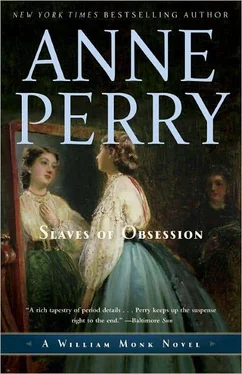Anne Perry - Slaves of Obsession
Здесь есть возможность читать онлайн «Anne Perry - Slaves of Obsession» весь текст электронной книги совершенно бесплатно (целиком полную версию без сокращений). В некоторых случаях можно слушать аудио, скачать через торрент в формате fb2 и присутствует краткое содержание. Жанр: Исторический детектив, на английском языке. Описание произведения, (предисловие) а так же отзывы посетителей доступны на портале библиотеки ЛибКат.
- Название:Slaves of Obsession
- Автор:
- Жанр:
- Год:неизвестен
- ISBN:нет данных
- Рейтинг книги:3 / 5. Голосов: 1
-
Избранное:Добавить в избранное
- Отзывы:
-
Ваша оценка:
- 60
- 1
- 2
- 3
- 4
- 5
Slaves of Obsession: краткое содержание, описание и аннотация
Предлагаем к чтению аннотацию, описание, краткое содержание или предисловие (зависит от того, что написал сам автор книги «Slaves of Obsession»). Если вы не нашли необходимую информацию о книге — напишите в комментариях, мы постараемся отыскать её.
Slaves of Obsession — читать онлайн бесплатно полную книгу (весь текст) целиком
Ниже представлен текст книги, разбитый по страницам. Система сохранения места последней прочитанной страницы, позволяет с удобством читать онлайн бесплатно книгу «Slaves of Obsession», без необходимости каждый раз заново искать на чём Вы остановились. Поставьте закладку, и сможете в любой момент перейти на страницу, на которой закончили чтение.
Интервал:
Закладка:
Monk looked across to see how Daniel Alberton felt about this intense loyalty in his daughter to a war five thousand miles away. There was a weariness in his host’s face which told of many such discussions, and no resolution.
Newspapers in London carried many stories about Mr. Lincoln, the new president, and of Jefferson Davis, who had been elected president of the provisional government of the Confederate States of America, those states that had broken away from the Union one by one over the last several months. For a long time many had hoped to avoid outright war, while others actively encouraged it. But with the bombardment of Fort Sumter by the Confederates, and its subsequent surrender on April 14, President Lincoln had asked for seventy-five thousand volunteers to serve for a period of three months, and proposed a blockade of all Confederate ports.
Newspapers suggested that the South had called for a hundred and fifty thousand volunteers. America was now at war.
What was far less obvious was the nature of the issues at stake. To some, like Merrit, it was simply about slavery. In reality it appeared to Monk to have at least as much to do with land, economics and the right of the South to secede from a Union it no longer wished to be part of.
Indeed, much sympathy in Britain lay with the South, although the motives for that were also mixed, and perhaps suspect.
Alberton’s patient tones came with an effort which for an instant was naked in his face.
“There are many causes, my dear, and some of them conflict with each other. There are no ends I know of which justify dishonorable means. One must consider-”
“There is nothing which justifies slavery!” she said hotly, cutting across him with no thought for the respect she owed him, especially in company. “Too many people use sophistries to defend not risking themselves or what they own in a fight.”
Judith’s hand tightened on her silver fork, and she glanced at her husband. Breeland smiled. A flush of irritation crossed Casbolt’s face.
“And too many people rush in to espouse one cause,” Alberton replied, “without taking a moment to weigh what their partisanship might cost another cause, equally just and equally in need of their help, and perhaps as deserving of their loyalty.”
It was apparent it was no philosophical argument. Something of immediate and highly personal importance was at stake. One had only to glance at Lyman Breeland’s stiff shoulders and unsmiling face, at the high color in Merrit’s cheeks, at Daniel Alberton’s very evident impatience, to know that.
This time Merrit did not reply, but her temper flared very visibly. She was in many ways still not much more than a child, but her emotion ran so deep that Monk found the situation on the verge of embarrassment.
The entree plates were removed and cherry pie and cream were served. They ate in silence.
Judith Alberton made some pleasant remark about a musical recital she had been to. Hester expressed an interest Monk knew she did not feel. She did not care for sentimental ballads, and he wondered, looking at Judith’s remarkable face, if his hostess really did either. It seemed a taste at odds with the strength of her features.
Casbolt caught Monk’s eye and smiled as if secretly amused.
Gradually the conversation began again, gentle and well mannered, with an occasional shaft of wit. The pie was succeeded by fresh grapes, apricots and pears, then by cheese. Light gleamed on silver, crystal and white linen. Now and then there was laughter.
Monk found himself wondering why Breeland had been invited. Discreetly he studied the man, his expression, the tensions in his body, the way he listened to the conversation as if intent upon interpreting from it some deeper meaning, and waiting his chance to intercede with something of his own. Yet it never came. Half a dozen times Monk saw him draw breath and then fail to speak. He looked at Merrit, when she was speaking, and there was a momentary softness in his eyes, but he scrupulously avoided leaning close to her or making any other gesture which might appear intimate, whether to guard her feelings or his own.
He was polite with Judith Alberton, but there was no warmth in him, as if he were not at ease with her. Considering her remarkable beauty, Monk did not find that difficult to understand. Men could be intimidated by such a woman, become self-conscious and prefer to remain silent rather than to speak, and risk sounding less than as clever or as amusing as they would have desired. He was probably ten years younger than she, and Monk had begun to suspect he was in love with her daughter, without her approval.
Casbolt showed no such lack of ease. His affection for Judith was apparent, but then as cousins they had probably known each other all their lives. Indeed he made several references, often in jest, to events in the past they had shared, some of which had seemed disasters at the time but had now receded into memory and no longer hurt. The pain or laughter shared made a unique bond between them.
They spoke of summer visits to Italy when the three of them-she, Casbolt, and her brother Cesare-had walked the golden hills of Tuscany, found gentle and idiosyncratic pieces of statuary that predated the rise of Rome, and speculated on the people who might have made them. Judith laughed with pleasure, and Monk thought he saw a shadow of pain as well. He glanced at Hester, and knew she had seen it also.
Casbolt’s voice held it too: the knowledge of something too deep ever to be forgotten, and yet which could be shared because they had endured it together; he, she and Daniel Alberton.
Nothing overt was said during the entire course of the meal, and certainly nothing remotely offensive. But Monk formed the opinion that Casbolt did not much like Breeland. Perhaps it was no more than a dissimilarity in temperament. Casbolt was a sophisticated man of wide experience and charm. He was at ease with people, and conversation came naturally to him.
Breeland was an idealist who could not forget his beliefs, or allow himself to laugh while he knew others were suffering, even for the space of a dinner. Perhaps it was a certain strangeness, being far away from his home at a time of such trial, and among strangers. And obviously he could not help responding to Merrit’s youth and her charm.
Monk had some sympathy with him. He had once been as passionate about great causes, brimming with zeal over injustices that affected thousands, perhaps millions. Now he felt such heat only over individuals. He had tried too often to affect the course of law or nature, and tasted failure, learning the strength of the opposition. He still tried hard and grieved bitterly. The anger seized up inside him. But he could also lay it aside for a space, and fill his heart and mind with the sweet and the beautiful as well. He had learned how to pace his battles-at least sometimes-and to savor the moments of respite.
The last course was almost completed when the butler came to speak to Daniel Alberton.
“Excuse me, sir,” he said in little above a whisper. “Mr. Philo Trace has called. Shall I tell him you are engaged, or do you wish to see him?”
Breeland swiveled around, his body stiff, his expression so tightly controlled as to be almost frozen.
Merrit was far less careful to hide her feelings. The color rose hot in her cheeks and she glared at her father as if she believed he were about to do something monstrous.
Casbolt glanced at the others in apology, but his face was alive with interest. Monk had the fleeting impression that Casbolt actually cared what he thought, then he dismissed it as ridiculous. Why should he?
Alberton’s expression made it plain that he had not expected the caller. For a moment he was taken aback. He looked at Judith questioningly.
Читать дальшеИнтервал:
Закладка:
Похожие книги на «Slaves of Obsession»
Представляем Вашему вниманию похожие книги на «Slaves of Obsession» списком для выбора. Мы отобрали схожую по названию и смыслу литературу в надежде предоставить читателям больше вариантов отыскать новые, интересные, ещё непрочитанные произведения.
Обсуждение, отзывы о книге «Slaves of Obsession» и просто собственные мнения читателей. Оставьте ваши комментарии, напишите, что Вы думаете о произведении, его смысле или главных героях. Укажите что конкретно понравилось, а что нет, и почему Вы так считаете.












